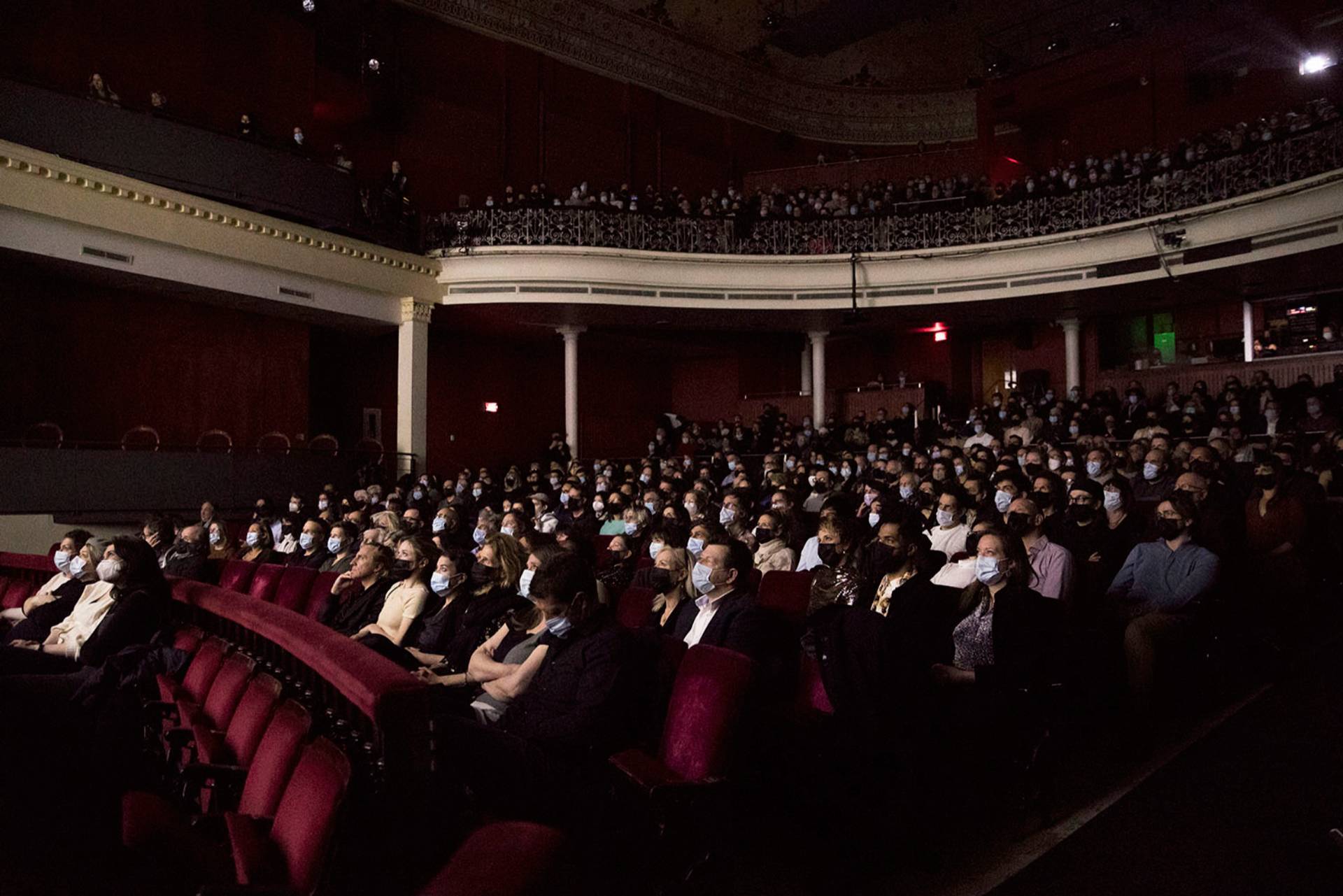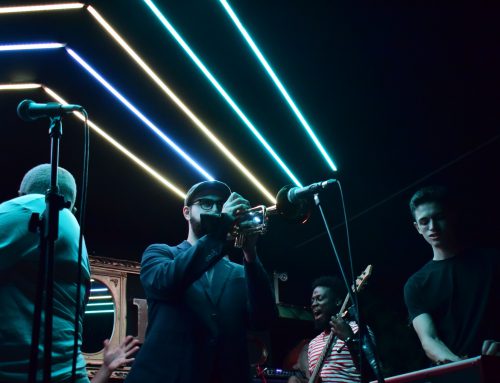BY Alexi Dubois & Olivier du Ruisseau
At the International Festival of Films on Art (FIFA), the pandemic encouraged them to create the arts.film platform as an online connection to FIFA movies and more. This software gives organisers the ability to switch their festival online with the click of a button.
“The festivals were forced to become very creative to stay alive,” says Caroline Johnson, co-general manager of Le REFRAIN which represents regional festivals in Quebec. While the pandemic might have left the industry in shambles, there are some positives to take away from it and creativity is at the top of that list.
“Arts.film allowed us to add a platform with choices that were not present at the festival and complemented our programming,” says FIFA’s Jérôme Rocipo.
In this way, the site works in collaboration with the in-person festival which took place as Montreal emerged from health shutdowns in March 2022.
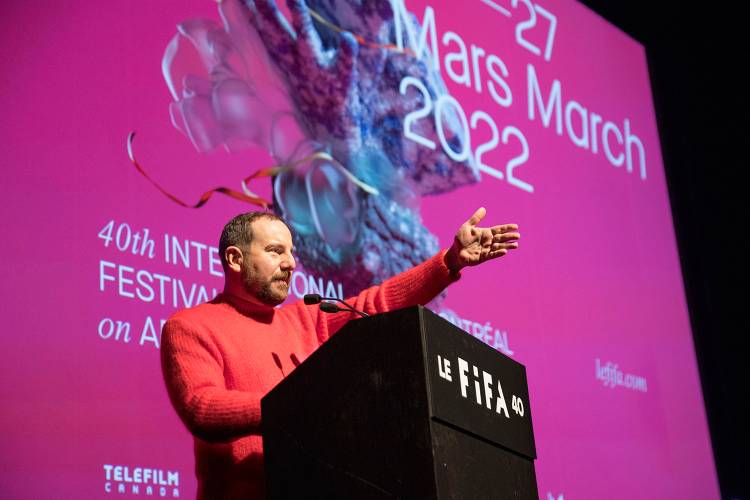
Philippe U. del Drago, FIFA general director speaking at the event. Photo by Maryse Boyce.
“Last year, we nearly doubled the number of tickets sold. By going online, our movies were able to be viewed across Canada,” says Philippe U. del Drago, artistic and general director of FIFA.
FIFA were in a unique situation where they were able to grow during the pandemic largely due to innovation and their Arts.film platform.
While this solution might have worked for FIFA, it was not as effective for other festivals. Between March 2020 and March 2021, only a quarter of Quebecers attended an online festival or event and the average sum they were ready to pay for these virtual events was $15. Limited participation and low prices is not a long-term solution for the industry.
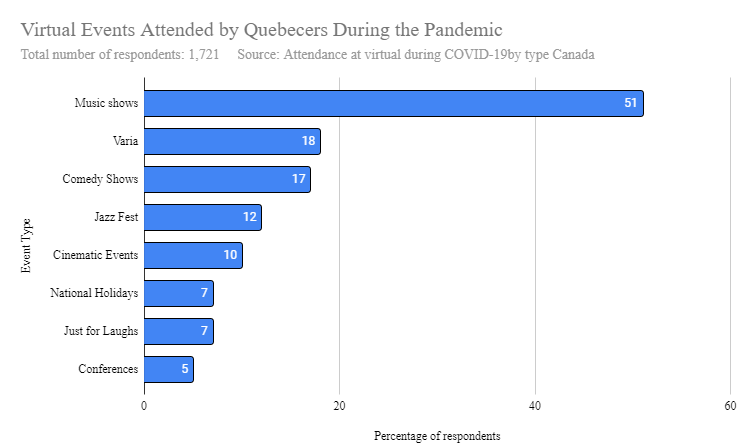
Music shows were by far the most widely attended virtual events. By Alexi Dubois.
Festivals across the province are climbing out of what feels like a very long hibernation. While we might have seen the rise of the “Zoom fest” over the past few years, these shows cannot wait to get back to venues packed with fans.
“They are not as healthy as they used to be, but they made it through,” says Johnson, of Le REFRAIN which groups more than 80 independent artistic festivals in Quebec. For the most part, festivals have survived the pandemic. While their finances and staff might have taken a hit, government subsidies and virtual events were enough to carry them through the worst of it.
“The government helped a lot by financing festivals through different programs,” Johnson says. Virtual concerts were less a way of making money and more a way of maintaining a festival’s visibility. While they did succeed in maintaining the brand of many events, they were not enough to keep the doors open and the lights on. As Johnson explained, that is where government subsidies made all the difference.
While subsidies helped the festivals, the industry is not out of the woods yet. Francois Chevrier, executive director of Événements Attractions Québec (EAQ), expects that the industry will not make a full return to pre-pandemic levels before 2024.

It will take until 2024 for the industry to make a full recovery. Photo by Olivier du Ruisseau.
According to Festival and Major Events Canada, over 190,603 travellers flocked to the province for festivals and other events. This put $148 million into the economy with a considerable portion of that money going to hotels and restaurants.
“The challenge is now. What we are asking for is to maintain a certain amount of aid. Even though festivals are returning to full capacity, they are not sure they will be able to be financially autonomous,” Chevrier explains.
Organisers are preparing for full capacity events, but experts agree that the industry will still take a few years to recover. That means the next few summers will still be trying times.
While Le REFRAIN and Événements Attractions Québec might be tempering expectations for the 2022 festival season, L’Équipe Spectra, the team behind Le Festival International de Jazz de Montréal, Francos de Montréal and Montréal en Lumière are all in for summer 2022.
“It will be a normal summer or there won’t be any summer at all,” says Laurent Saulnier, vice-president of Programming at Spectra Festivals. The Jazz Festival plans on taking place fully in-person this year and they do not have any contingency plans for going online.
“Since the beginning of the pandemic, there has not been a single outbreak in a Montreal concert hall,” Saulnier says. He is confident that festival-goers will feel safe and be ready to party in close proximity to others. In Saulnier’s experience, COVID-related anxiety disappears the closer you get to a stage.
“There is no chance that you will see the Jazz Festival on your computer from home,” Saulnier says.
While festival organizers might be ready to turn the page on the days of online festivals, artists do not necessarily agree.
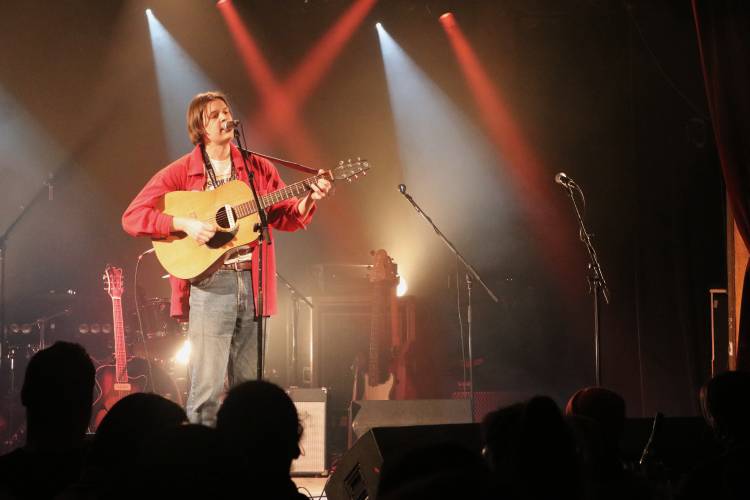
Singer Thierry Larose performing at Les Francouvertes. Photo by Olivier du Ruisseau.
As Chevrier explains, “virtual concerts allow festivals to reach a more diverse audience.”
For the artists performing, this gives them the possibility of growing their brand and increasing their name recognition.
Musicians and filmmakers say they want online measures that were first implemented as solutions to the pandemic to remain at the same time as they get back to in-person events because they say they give them more visibility. Video by Olivier Du Ruisseau.
One concern that is plaguing festivals emerging from the pandemic is the lack of staff. During the shutdowns, highly qualified stagehands and other professionals switched careers due to the lack of employment. Now that they are back in high demand, festivals big and small are struggling to find the staff they need to make their events happen.
“I was speaking to a festival this morning whose biggest issue was finding staff,” Johnson says.
For the smaller independent festivals that her group represents, losing just two staff members can be a devastating blow to a festival.
“There is a lack of people working in the music business,” explains Saulnier of Spectra. He speculates that with a labor shortage across the board in Quebec, the music industry was especially hard hit.
“Older volunteers are worried about the risk of returning,” says Chevrier of EAQ. While finding volunteers was difficult before the pandemic, it is even more complicated now. Again, festivals have been forced to get creative. Some even resorted to forming partnerships with scout and cadet organisations in order to find the manpower they need to run their events.
Even with the staff shortages, the shows will go on.
“Venues are booked until the end of 2022 and there will be a lot happening,” Saulnier says.
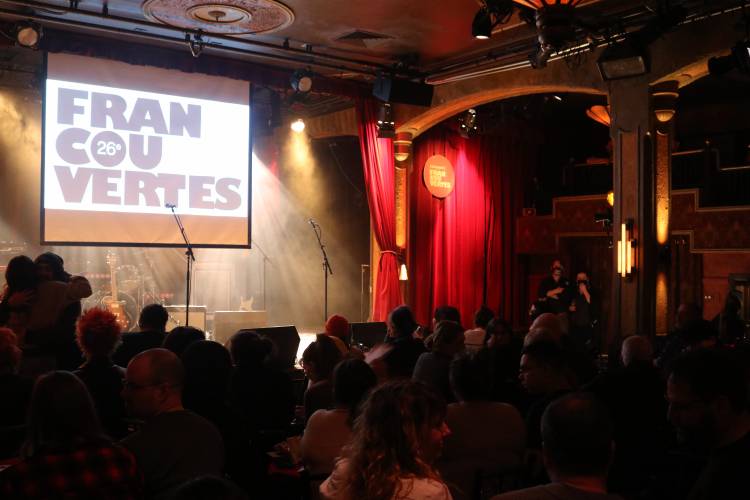
A crowd prepares to enjoy les Francouvertes at Le Cabaret Lion d’Or in Montreal. Photo by Olivier du Ruisseau.
He hopes that the population will have an appetite for festivals and all kinds of live entertainment because if bookings are any indication, the industry is looking to come back with a vengeance.
“In 2022 and 2023, there will be more concerts. People want to tour, and people want to play,” says Saulnier with confidence. As long as the population is ready to party, the festivals will be there to accommodate them.
